Topic outline
This course explains why parental selection is important and how it can be done effectively based on various types and sources of data and information. The issues associated with transferring traits from non-adapted germplasm sources are described. The module also illustrates how segregating populations are handled and how the desired traits are maintained in future generations of crossing and selection. Finally, the unit explains how genes of interest can be identified and tracked using a variety of methods and technologies.



The course is, primarily, for germplasm curators and plant breeders and their support and collaborating personnel, university lecturers and students engaged in germplasm management and/or crop improvement. It is also recommended for extension agents, seeds specialists, field technicians and relevant research administrators and managers.
- The importance of parental selection and the main methods based on genotypic and phenotypic information.
- Recognizing the issues regarding the use of exotic germplasm for breeding.
- The general principles of managing segregating populations generated from parental crossing according to the particular type of crop.
The course consists of 4 lessons, ranging from approximately 60 to 85 minutes duration each:
- Lesson 1 – Principles and Methods of Parental Selection
- Lesson 2 – Transferring Traits from Non-adapted Materials
- Lesson 3 – Managing Segregating Populations
- Lesson 4 – Identifying Genes of Interest
The online version of this course runs on the latest versions of the major browsers, such as Chrome, Safari, Edge and Firefox.
The downloadable version only runs on Windows PC’s and no additional software is needed.
Evaluate this course
We would be pleased to receive your evaluation of this course, to support us in improving future e-learning courses. Please click on the button below to answer the questions in the form. It should only take you a few minutes!








